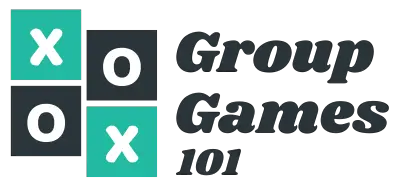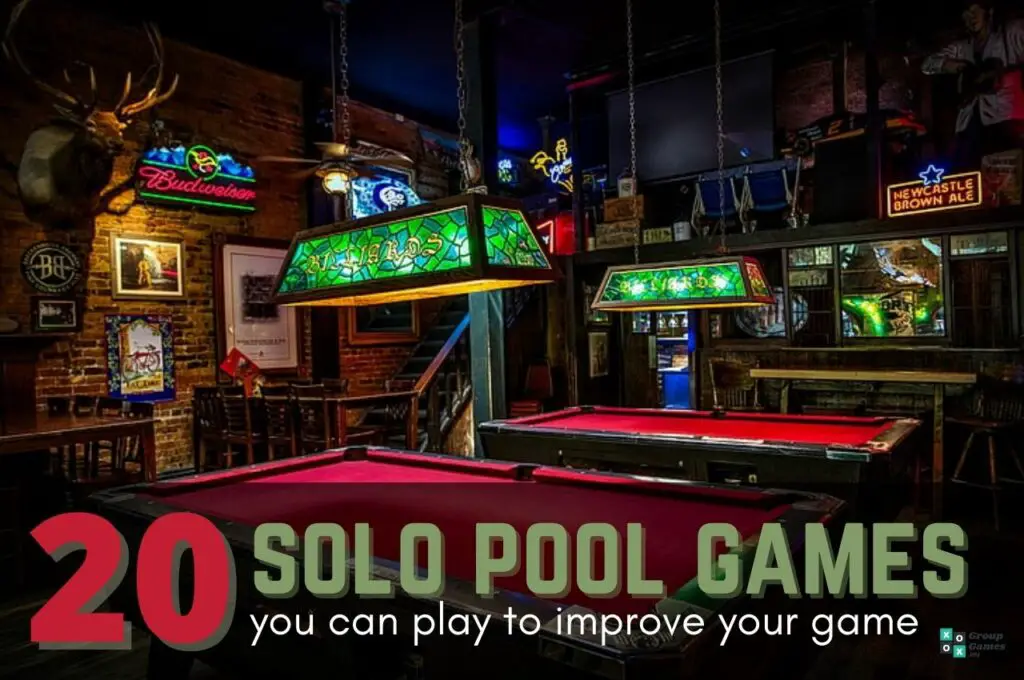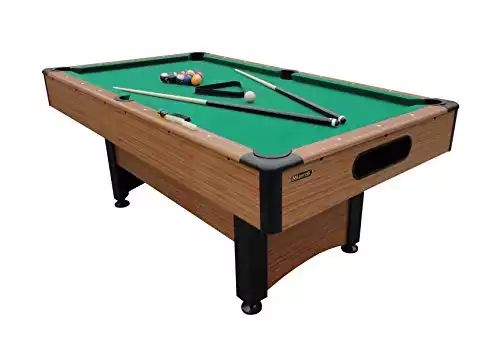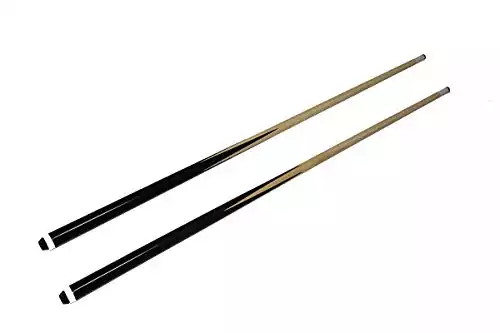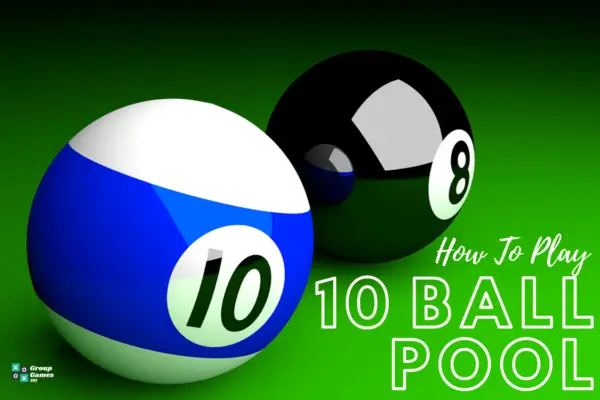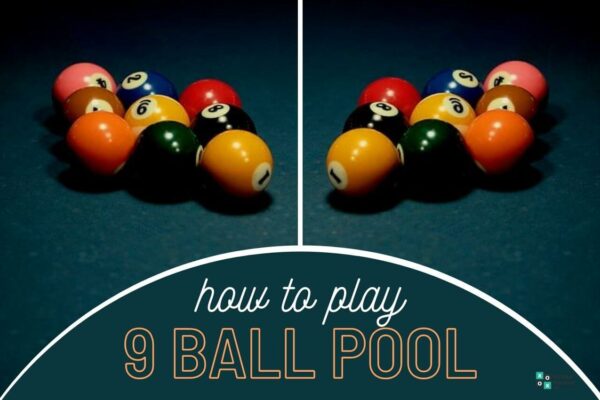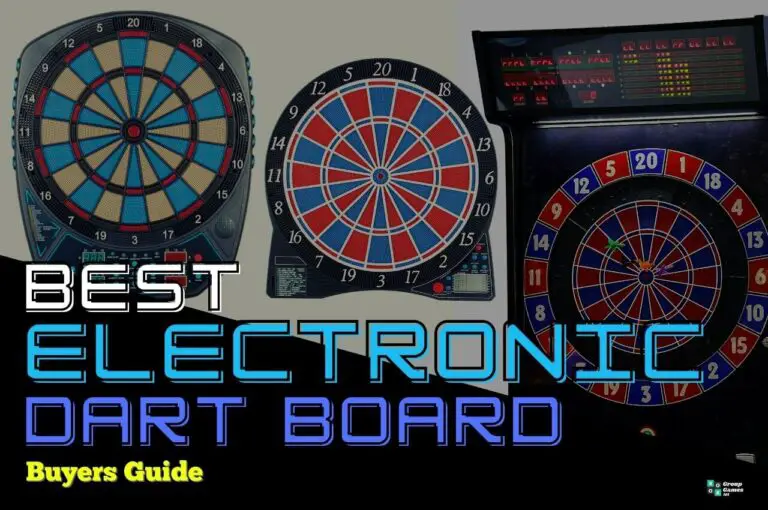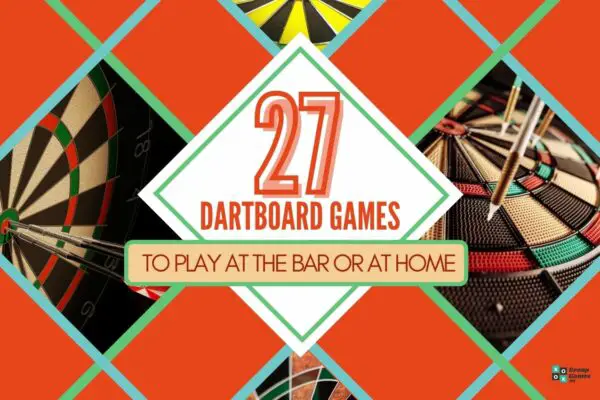Ever find yourself on the receiving end of more than your fair share of losses when playing pool with your pals? Although pool is usually considered a multi-person game, you can play many solo pool games to improve your skills if you are suffering defeats.
Playing them regularly should mean you’ll become a pool expert in no time.
And once you’re a pool expert, you can beat your friends at a variety of pool games that are for two players or more.
Many pool games need a specific set-up, so learn how to rack pool balls before you begin playing.
Once you’ve learnt how to set-up properly, and assuming you have a pool table to play on, check out below our list of 20 solo pool games to play so that you can learn how to become a pool playing pro.
The 20 Best Solo Pool Games to Play
Below is a list of the best solo pool games you can play that will help sharpen your cue stick playing skills.
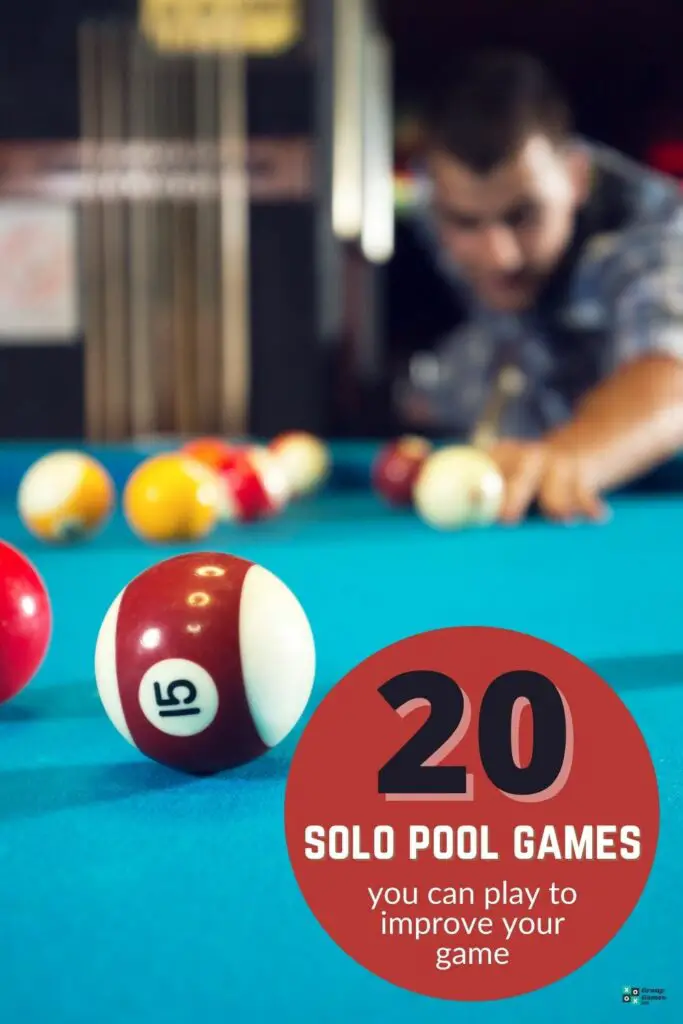
SOLO 8 BALL POOL
Players: 1.
Ages: All ages.
Length of Play: 15 – 20 minutes.
Why it’s fun: Arguably the most obvious and popular solo game to play. 8 ball pool is usually the game that you and your pals will play so it makes sense to start by learning the rules and tricks to this first of all. It helps that it’s great fun as well.
Game Objective: Like the 8 ball rules that you would play with a second person. Rack up the balls in the way that you learnt in the ‘How to Rack Pool Balls’ guide. The aim is to pot all the striped balls first. Once you have potted these, pot the ‘spots’ as well. The black ‘8 ball’ gets potted last, but you’ll need to nominate a pocket first. If the 8 ball goes into a pocket that isn’t nominated you lose the game.
SOLO 9 BALL POOL
Players: 1.
Ages: All ages.
Length of Play: 15 – 20 minutes.
Why it’s fun: If you enjoy Solo 8 Ball Pool, then you are near guaranteed to also enjoy Solo 9 Ball Pool.
Game Objective: Also very like the competitive 9 ball pool rules. It is also like the 8 ball iteration of the game, except an extra ball is present so the black ball is now the ‘9 ball’. Pot all the stripes, then pot the spots. Finally, pot the 9 ball. You do not need to pick a pocket in 9 ball pool. To make it even more of a challenge if you’re finding this game too easy, give heavy penalties for a ‘foul’ if you manage to incur one.
SOLO 10 BALL POOL
Players: 1.
Ages: All ages.
Length of Play: 15 – 25 minutes.
Why it’s fun: Possibly the hardest version of the standard pool games, 10 ball pool challenges the real pros. Once you’ve mastered this game, then any other solo pool game should become easy.
Game Objective: 10 ball pool rules are basically the same as the 8 ball and 9 ball varieties. Set up and start playing in the same way as the other two games. However, you must call a number and the pocket that you would like to pot the ball into. If the ball goes into another pocket, then it gets removed and put back onto the table. If a ball doesn’t get called and it goes into a pocket, then it also has to go back onto the table. Pot the stripes first, followed by the spots and then the black 10 ball.
14.1/STRAIGHT POOL
Players: 1.
Ages: All ages.
Length of Play: 20 – 40 minutes.
Why it’s fun: A game of pool that predates the more popular versions such as 8 or 9 Ball Pool. It is a slower game so ideal if you have a fair bit of freetime. The game is easier to play on your own than other examples as it is continuous, although you can easily adapt for more players.
Game Objective: The goal of 14.1 is to pot continuously until you reach a certain score. This will mean that multiple racking will occur as usually the score to aim for is 21. It is also a ‘call-pocket’ game, so shots only count if you have called the pocket that the ball ends up in. Record how many shots it takes you to get to 21, and try to break that record every time you play.
SPEED POOL
Players: 1.
Ages: All ages.
Length of Play: 5 – 30 minutes, depending on skill and confidence.
Why it’s fun: If you’re finding any of the 8, 9 or 10 ball pool games too easy, speed pool adds a bit of pressure to proceedings. If you play regularly then you have unlimited time to make your shots. Playing with a timer can replicate the feeling of competition that you would have when playing with other people.
Game Objective: Decide which version of pool you are looking to play. Then decide on how long you are going to give yourself to pot all the balls. Rack the balls up and break as normal. There are slight differences in rules to 8, 9 and 10 ball pool so refer to those guides to get the correct rules. Try to improve your time on each go to improve your quick thinking and decision making abilities.
BACKWARDS POOL
Players: 1.
Ages: Most ages, it may be a bit too difficult for younger players.
Length of Play: 15 – 30 minutes.
Why it’s fun: Devilishly difficult, the game is also sometimes known as ‘Chinese pool’. The game is ideal for teaching you about angles and trajectories, which should help with your overall pool ability.
Game Objective: Rack and break the balls as per normal. Now for the tricky bit. Rather than the usual way of potting balls with the white ball, instead hit balls off of the cue ball to pocket them. So hit each ball into the white ball to make it go into the pocket. There isn’t an order to which balls you pocket as the game is hard enough already! If you manage to do this then it should get easier every time you play.
GHOST POOL
Players: 1.
Ages: All ages.
Length of Play: 10 – 20 minutes.
Why it’s fun: Like Speed pool, the idea of Ghost pool is to replicate the competitiveness that usually comes with playing with an opponent. Ghost pool takes a more obvious approach, but still gives a good amount of motivation when playing by yourself.
Game Objective: Again, decide which version pool you are trying to sharpen your skills with. Set the game up the same way that you would if you were playing against another person. Rack up and break, and give yourself a shot in hand by moving the cueball to any position you choose. Follow the rules of the chosen game, but if you either miss a shot or scratch the ‘ghost’ wins the game. Set a target number for you and the ‘ghost’ to see who ultimately wins the game.
TARGET POOL
Players: 1.
Ages: All ages.
Length of Play: 5 – 10 minutes depending on how many shots you choose to do.
Why it’s fun: Although this game is probably more akin to a drill, it is still fun to play and really can improve your pool skills. Being able to play different shots is one of the most important aspects to get right if you are looking to become a pool pro. This game should teach you the necessary skills to pot from almost anywhere on the table.
Game Objective: As opposed to other games on this list, racking up and breaking is not necessary. Instead, you will need to place the spots and stripe balls around the table in different positions in which to aim for. Try to replicate scenarios that you have previously struggled with and attempt to use angles to pot the balls in one shot.
BACA POOL
Players: 1.
Ages: All ages.
Length of Play: 10 – 20 minutes.
Why it’s fun: A great pool game to play by yourself, Baca Pool teaches players to make shots that are likely to not result in a foul. It’s another game where you’ll need a scoring system, so it’s easy to see how much you’re improving.
Game Objective: Rack up and break as you would do in a standard game. The idea of Baca pool is to start potting either the stripes or the spots one after another. Start with a score of 10. If you miss a shot or commit a foul, then you remove a point from the total. Only aim for the spots or stripes as it adds to the challenge. Play across 10 rounds and see how close to a perfect 100 you can get your score.
TRICK SHOT
Players: 1.
Ages: All ages.
Length of Play: 5 – 10 minutes depending on how many shots you choose to do.
Why it’s fun: Uses the same principles as a similar game in Target Pool. Another drill rather than a game, this one has more of a ‘wow’ factor that may impress any interested onlookers. If you can master these, then there won’t be many pool shots that you can’t do.
Game Objective: This game doesn’t require racking up or breaking. You will need the balls in order to set up different scenarios that you are challenging yourself to pot. The idea of Trick Shot is to bounce the cue ball off of the cushion to attempt to pot the balls. When playing a competitive game, there will be different scenarios where the only way you can pot a ball is by cannoning it off the cushion. Being able to do this can really help you out in tricky situations.
CLEAR UP
Players: 1.
Ages: All ages.
Length of Play: 10 – 15 minutes.
Why it’s fun: Clear Up teaches players how to pocket each ball so that they set themselves up for the next pot. It’s an entertaining way to take your pool skills to the next level and make players understand that there is more to a shot than just being able to pot.
Game Objective: Set up your game by positioning the balls around each pocket, but don’t put them right over the pocket as this would make the game too easy. Putting them against the cushion is ideal as it gives players a bit of challenge. The goal is to be able to pot each ball without missing. You will need to plan your shot so that the cue ball not only pots but is also in position to be able to make the next shot. If you miss, start again from the beginning.
SNOOKER POOL
Players: 1.
Ages: All ages.
Length of Play: 10 – 15 minutes.
Why it’s fun: Combining the gameplay of pool with the scoring of snooker, playing this solo game gives a new perspective on playing shots. Sometimes the most obvious shots aren’t the best ones to take and this game epitomises this nicely.
Game Objective: Before playing, assign a value to the different balls that’s on the table. For example, give yourself the score that corresponds with the number that is on the ball. The objective is to score as many points as possible within a designated amount of shots, so give yourself around 10 shots. Start as always by racking up and breaking, and then start potting the balls. With this game, taking riskier shots to get more points should encourage you to learn how to take shots that you may not have previously noticed.
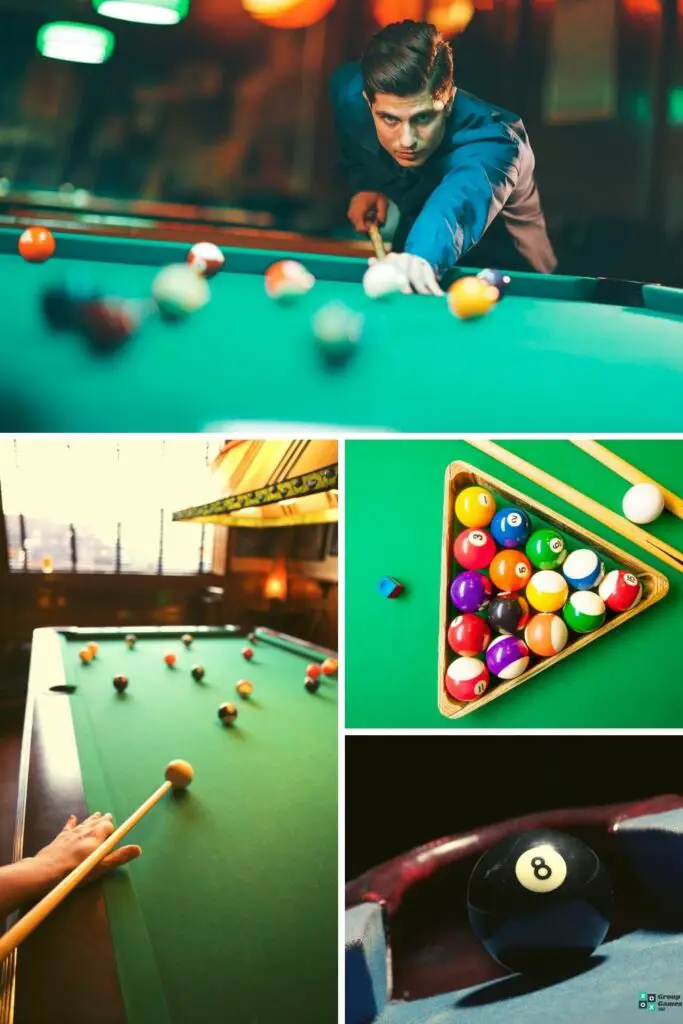
GOLF POOL
Players: 1.
Ages: All ages.
Length of Play: 10 – 30 minutes depending on how many ‘holes’ you play.
Why it’s fun: Combining pool with golf, the idea is to improve your score with every game that you play of Golf Pool. It’s ideal for getting an idea on how much you’ve improved with potting balls with the more difficult shots.
Game Objective: Similar to golf, the idea is to set up different shots and pot the black ball within a certain amount of shots. Use the remaining balls spotted and striped as obstacles for you to navigate around. For each shot that you take, decide on what the ‘par’ should be on the difficulty of the shot. This means how many shots you are expecting to take to pot the black. Give yourself a score depending on how many shots you’ve taken, with 0 if you get it in the recommended amount of shots or +1/-1 if you got it 1 under or over par etc. Try to play at least 9 different shots to give an overall score just like golf.
BOWLIIARDS
Players: 1.
Ages: All ages.
Length of Play: 10 – 20 minutes
Why it’s fun: If you’ve ever had to decide whether to play bowling or pool then with Bowlliards it combines the best of both games. Like Golf Pool, the scoring is what differentiates the game and uses a similar scheme to actual bowling. This is also a game that you can easily adapt to involve any number of players.
Game Objective: Rack up and break the same as per usual. Each ‘frame’ lasts 10 shots not including the break. The requirement is to pot as many balls after the break as possible within the 10 shots. A score is for that frame based on how many balls you pot. If 10 balls gets potted, then that counts as a strike and 9 balls counts as a spare. Add your score up after 10 frames, with 300 being the maximum score that you achieve like in bowling.
FARGO POOL
Players: 1.
Ages: All ages, but the rules can be very involved as there is a lot to it.
Length of Play: 20 – 30 minutes.
Why it’s fun: Similar to Snooker Pool except longer and with a few more rules added in to mix the gameplay up. Fargo Pool is another game that is ideal for working on picking the best shot and being successful in making the shot.
Game Objective: Fargo Pool is in ‘innings’ of 10. Each innings has two parts to it, a random phase and a rotation phase. Rack up the balls and break as normal. The goal is to get as many points as possible across the game. An innings lasts when you pot all the balls, and phases switch between innings. Scoring changes depending on the phase that you are on. The random phase means you can pot whatever ball that you would like, and scores 1 point per pot. The rotation phase is where you pot the balls in numerical order starting with the lowest and scores 2 points per pot. The pocket of each shot needs calling, failure to do so means no score for that pot. For every foul, deduct 5 points from your score.
THREE BALL POOL
Players: 1.
Ages: All ages.
Length of Play: 5 – 10 minutes.
Why it’s fun: A very quick and easy game that is best played when you only have a small window of time free. It is one of the Solo Pool Games with the simplest rules, yet it will still teach players how to effectively plan their shots.
Game Objective: Take any random three balls and set them up at the correct end of the table in a triangle formation. The goal to this game is to pot all three balls with the fewest number of shots possible. It’s not impossible to pot all three with the initial break shot so that should be the ultimate end goal. Penalise a foul by adding an extra shot to your total for each foul.
FIFTEEN IN A ROW
Players: 1.
Ages: All ages.
Length of Play: 10 – 25 minutes.
Why it’s fun: The ultimate pool game for players to hold their nerve. Fifteen in a row is the game where you can pull everything that you’ve been practicing on together and see how good your pool skills have really come.
Game Objective: The objective to Fifteen in a Row is pretty much exactly as it sounds. Pot all the balls in a row without missing a shot. If you miss a shot or commit a foul then you will have to start all over again. Other than that, rack up the balls and start potting! You don’t need to do this in any particular order, but if you’re a real pro you can try to pot them numerically.
THREE TOUCH
Players: 1.
Ages: All ages.
Length of Play: 5 – 10 minutes.
Why it’s fun: There are different variations of Three Touch but the main game stays the same in all of them. It’s a great game for practicing the weight of each shot that you take and doesn’t even require any balls to play.
Game Objective: Set up the triangle in the usual place where you would usually rack the balls. This becomes an obstacle for Three Touch. Place the cue ball in its usual place that you would as if you were breaking. The objective is to get the cue ball around the triangle and back behind the break line, but the cue ball cannot touch the cushion or you have to start again. Players have to achieve this within three shots. It’s a game that may seem easy at first but will take many more attempts then you expect.
ONE POCKET
Players: 1.
Ages: All ages.
Length of Play: 10 – 20 minutes.
Why it’s fun: It’s standard pool as you know it, except it has one specific rule which completely changes the way that you play. One Pocket pool is a pool game that should really help you improve your accuracy and the way you think about shots.
Game Objective: Rack up and break as normal. Follow the rules to any other pool game that you fancy playing as these stay the same. The one difference is that you can only pot the balls in a nominated pocket. Potting a ball in any other pocket counts as a foul and you must put the potted ball back on the table.
DIZZY POOL
Players: 1.
Ages: All ages, but probably should be for the adults.
Length of Play: 10 – 20 minutes.
Why it’s fun: Lets face it, if you’re playing pool with the pals then it’s more than likely going to involve plenty of brews as well. And the more booze you drink, the worse your pool skills are likely to be. For a bit of fun, try to recreate that feeling by giving Dizzy Pool a try.
Game Objective: Start by grabbing your pool cue and place the tip on your forehead whilst you look down. Spin around for 30 seconds on the spot until you are nice and dizzy. Proceed to play any chosen game whilst dizzy to recreate the feeling of playing whilst buzzed. You may even make this a two player game by seeing who can pot all the balls quickest.
Solo Pool Games Frequently Asked Questions
What are some important pool terms that would be handy to know?
Like many games, you’ll come across some specialist terms which may not be clear at first but when understood will give you the lingo to back up your master pool skills.
Rack – The term that refers to the striped, spotted and black balls in the triangle before play begins. ‘Rack them up’ is usually said in reference to setting the balls up.
Break – How most games of pools start. To break is to hit the white ball into the rack as you are ‘breaking’ up the balls in the rack.
Run the rack – Potting every ball one after the other is ‘running the rack’.
Scratch – A ‘scratch’ means potting the white ball at the same time as another ball. It incurs a foul and refers to the fact that the shot has to be ‘scratched’ off.
Call-pocket – This term means choosing a pocket in which you wish to pot a ball in. It’s used in some games in order to increase the difficulty. A foul happens if the ball goes into a pocket that isn’t called.
Triangle – The wooden object shaped like a triangle used to rack the balls at the start of the game.
What does it mean if a player ‘fouls’ in Solo Pool Games?
A foul means that a player has made a shot illegally that isn’t allowed in the rules of the game. There are several ways that a player can cause a foul depending on which game you play.
The most common include the cue ball not hitting your designated color, the cue ball hitting the other team’s color ball before yours and potting the white ball.
Potting the black ball is also a foul and usually results in an instant loss to the player who committed the foul. There are others but are also game dependent.
If playing solo. decide before playing what also counts as a foul and the penalty for causing one.
Do different pool cues make a difference to pool performance?
Different pool cues can certainly make a difference to how you play, and the cues come in different sizes and weights.
What cue works best for you is dependent on various factors, such as your height. Experiment with different cues before purchasing.
In terms of what cues to go for, a cue from East Eagle is certainly a cost effective way to get you started. It’s also available in different sizes as well.
Try Your Hand at Improving Your Darts Game Too
With our list of Solo Pool Games there should be several games that you’re willing to try out in order to be the most skilled player within your circle.
If you run a pool club or a bar, then you can adapt some of these games into training drills so that your team can also improve their skills as well.
And once you believe that your pool skills have improved, you’ll be ready to move onto pool games that involve multiple people.
If you regularly play pool in a bar, then there would be a good chance that you enjoy dart games as well.
Darts is one of the most versatile games that you can play with your pals, with a surprising amount of variety involved with the games.
Check out some of our favorite dartboard games for competitive yet hilarious games that you can play with a dartboard.
If you’re able to master both pool and darts, then you should become a legend in your local bar in no time at all.
